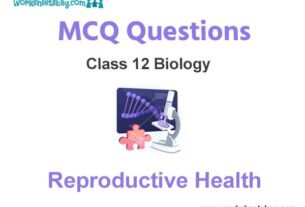Please refer to Human Strengths and Meeting Life Challenges MCQ Questions Class 12 Psychology below. These MCQ questions for Class 12 Psychology with answers have been designed as per the latest NCERT, CBSE books, and syllabus issued for the current academic year. These objective questions for Human Strengths and Meeting Life Challenges will help you to prepare for the exams and get more marks.
Human Strengths and Meeting Life Challenges MCQ Questions Class 12 Psychology
Please see solved MCQ Questions for Human Strengths and Meeting Life Challenges in Class 12 Psychology. All questions and answers have been prepared by expert faculty of standard 12 based on the latest examination guidelines.
MCQ Questions Class 12 Psychology Human Strengths and Meeting Life Challenges
Question. The cognitive theory of stress was proposed by—
(a) Selye
(b) Endlar
(c) Parker
(d) Lazarus
Answer
D
Question. The coping strategies given by Endler and Parker is—
(a) Task-oriented and Emotion-oriented
(b) Avoidance-oriented, task-oriented and emotion-oriented
(c) Problem-focused and emotion-focused
(d) None of the above
Answer
B
Question. Frustration-aggression is a very famous hypothesis proposed by—
(a) Roger
(b) Dollard and Miller
(c) Maslow
(d) Endler and Parker
Answer
B
Question. The father of modern stress research is—
(a) Elder
(b) Lazarus
(c) Hans Selye
(d) Parker
Answer
C
Question. is used to describe the unpleasant emotional state that results from blocked goal seeking, rather than the event itself.
(a) Conflict
(b) Frustration
(c) Aggression
(d) Regression
Answer
B
Question. _____________ is a dynamic situation-specific reaction to stress.
(a) Exhaustion
(b) Coping
(c) Management of stress
(d) Dealing with stress
Answer
B
Question. Hans Selye defined stress as—
(a) The patter of responses an organism makes to extreme event that disturbs the equilibrium and exceeds a person’s ability to cope.
(b) The non-specific response of the body to any demand.
(c) All challenges, problems and difficult circumstances.
(d) The phenomenon that increases the probability of one’s survival.
Answer
B
Question. Which are types of stress appraisal given by Lazarus?
(a) Environmental, psychological and social.
(b) Primary and secondary.
(c) Cognitive, emotional, psychological and social.
(d) Physical, personal and social.
Answer
B
Question. Which of the following coping behaviours are problem-focused?
(a) Making efforts to improve one’s performance after a setback
(b) Hiding examination results from parents
(c) Finding fault with classmates for poor marks in tests
(d) Feeling sorry for poor marks in a test
Answer
A
Question. The reaction to external stressors is called—
(a) Strain
(b) Stress
(c) Tension
(d) Stress response
Answer
A
Question. An earthquake comes under which of the following types of stress?
(a) Social stress
(b) Physical and environmental stress
(c) Social stress
(d) None of the above
Answer
B
Question. The general adaptation syndrome consists of three stages which include—
(a) the alarm reaction
(b) the stage of resistance
(c) the stage of exhaustion
(c) all of the above
Answer
C
Question. Frustration results from—
(a) Incompatibility between two or more needs or motives
(b) Blocking and needs/motives
(c) Expectation from oneself and others
(d) Excessive demands
Answer
B
Question. T cells, B cells and Natural killer cells are kinds of—
(a) Red blood cells
(b) White blood cells
(c) Antibodies
(d) Antigens
Answer
B
Question. The measure of stressful life events was developed by—
(a) Singh, Kaur and Kaur
(b) Holmes and Rahe
(c) Lazarus and Folkman
(d) Das, Naglieri and Kirby
Answer
B
Question. The physical, environmental and social causes of the stress state are termed—
(a) Stress
(b) Stressors
(c) Distress
(d) None of the above
Answer
B
Question. Disease-causing agents are known as—
(a) Leucocytes
(b) Antigens
(c) Antibodies
(d) Pathogens
Answer
D
Question. The three types of stress are—
(a) Physical and environmental, psychological and social.
(b) Physical, personal and social.
(c) Physiological, behavioural and emotional.
(d) All of the above.
Answer
A
Question. The problem-focused and emotion-focused coping responses were given by—
(a) Lazarus
(b) Folkman
(c) Lazarus and Folkman
(d) Endler and Parker
Answer
C
Question. Frustration, conflicts, internal and social pressures are sources of which of the following kinds of stress?
(a) Psychological stress
(b) Physical and environmental stress
(c) Social stress
(d) None of the above
Answer
A
Question. ___________ are also major stressors.
(a) Frustration
(b) Conflict
(c) Aggression
(d) Both (a) and (b)
Answer
D
Question. The study of links between the brain, the mind and the immune system is known as—
(a) Psychoneurology
(b) Psychoimmunology
(c) Psychoneuroimmunology
(d) Psychology
Answer
C


